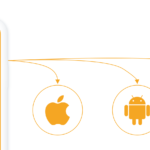Choosing the right development approach for your mobile app is a crucial decision. Businesses often struggle between using React Native or opting for native development. Both options have their pros and cons, depending on the project’s needs, budget, and long-term goals. Many companies choose to hire React Native developers to optimize their development process while balancing cost and efficiency. In this article, we will compare React Native and native development to help you decide the best approach for your mobile application.
Understanding React Native and Native Development
What is React Native?
React Native is an open-source framework developed by Facebook that allows developers to build cross-platform mobile applications using JavaScript and React. This means that a single codebase can be used for both iOS and Android, significantly reducing development time and costs. Many businesses hire React Native developers to build scalable and high-performing mobile applications efficiently.
What is Native Development?
Native development involves creating applications specifically for a single platform using platform-specific programming languages—Swift or Objective-C for iOS and Java or Kotlin for Android. Native apps offer superior performance and better integration with the device’s hardware and operating system features.
Key Differences Between React Native and Native Development
1. Performance
Native development provides better performance since apps are built using platform-specific languages and directly interact with the device’s hardware. On the other hand, React Native apps may experience performance limitations, especially for graphics-intensive applications, since they rely on a JavaScript bridge to communicate with native components.
2. Development Speed and Cost
If you are looking for a cost-effective solution, React Native is the way to go. With a single codebase, businesses can save both time and resources, reducing the need to maintain separate teams for iOS and Android. Many companies hire remote developers skilled in React Native to speed up the development process while maintaining high efficiency.
Conversely, native development takes longer as developers must write separate codebases for each platform, leading to higher costs and longer project timelines.
3. User Experience
User experience is often superior in native development because it allows better optimization for platform-specific UI elements. Native applications feel smoother and more responsive due to direct access to native APIs. However, React Native has improved significantly, offering near-native experiences with its reusable UI components.
4. Scalability and Maintenance
React Native makes it easier to scale applications as updates and bug fixes can be applied simultaneously across platforms. This reduces maintenance efforts and costs. Native apps, however, require separate maintenance for iOS and Android, increasing the complexity and cost of updates.
5. Third-Party Library Support
React Native has an extensive library of third-party plugins that enable quick integration of various features. However, some advanced native functionalities may not be readily available and may require custom native modules. Native development, being platform-specific, allows developers to leverage the full potential of the operating system’s built-in features.
When to Choose React Native?
- Budget Constraints: If you need a cost-effective solution without compromising quality, hiring React Native developers can help you achieve that.
- Faster Time-to-Market: React Native is ideal for businesses looking to launch their app quickly.
- Cross-Platform Development: When targeting both iOS and Android users with a single codebase.
- Simple to Moderate Complexity Apps: React Native works best for applications that don’t require extensive device-specific functionalities.
When to Choose Native Development?
- High-Performance Requirements: If you need a high-performance app, such as a gaming or AR/VR application.
- Complex UI/UX Needs: Apps requiring advanced animations and interactions perform better with native development.
- Device-Specific Features: If your app heavily relies on hardware features like Bluetooth, camera, or sensors.
- Long-Term Scalability: If you anticipate regular updates and improvements, native development ensures better long-term support.
Conclusion
Choosing between React Native and native development depends on your project requirements, budget, and timeline. If cost-effectiveness, speed, and cross-platform compatibility are your priorities, it’s wise to hire React Native developers to develop your app efficiently. However, if performance, advanced UI, and device-specific functionalities are critical, native development is the better choice.
Businesses also benefit from hiring remote developers to scale their teams flexibly, ensuring they have access to top talent for both React Native and native development projects. Ultimately, assessing your business goals and technical needs will help you determine the best approach for your mobile application.

